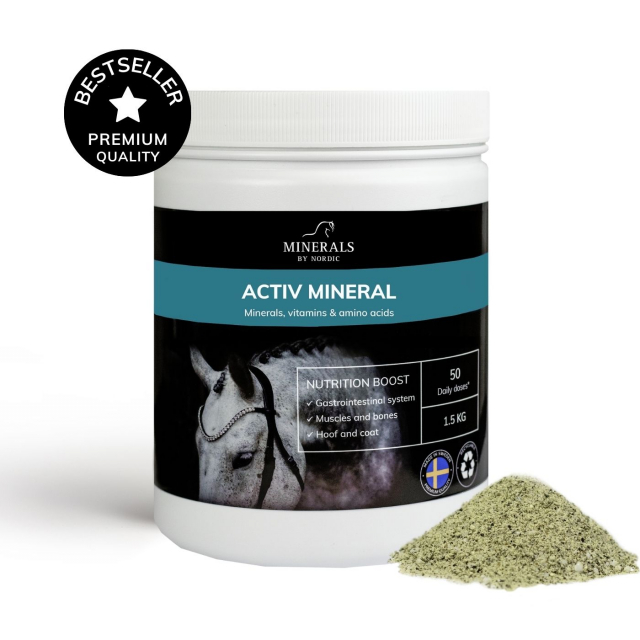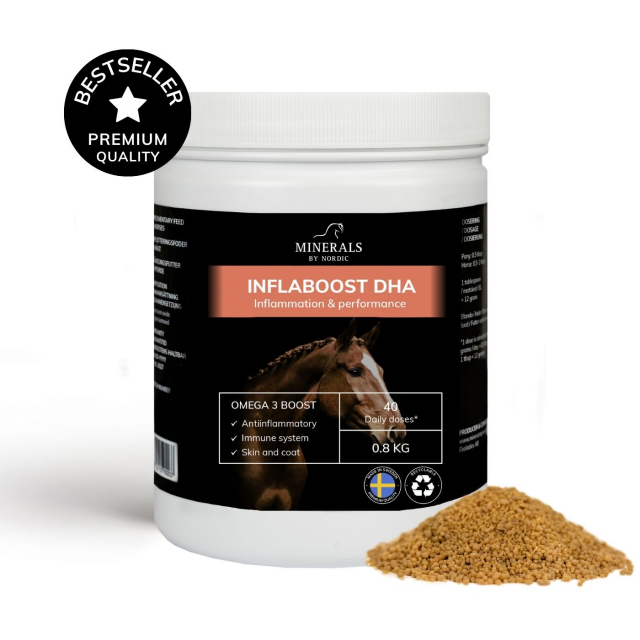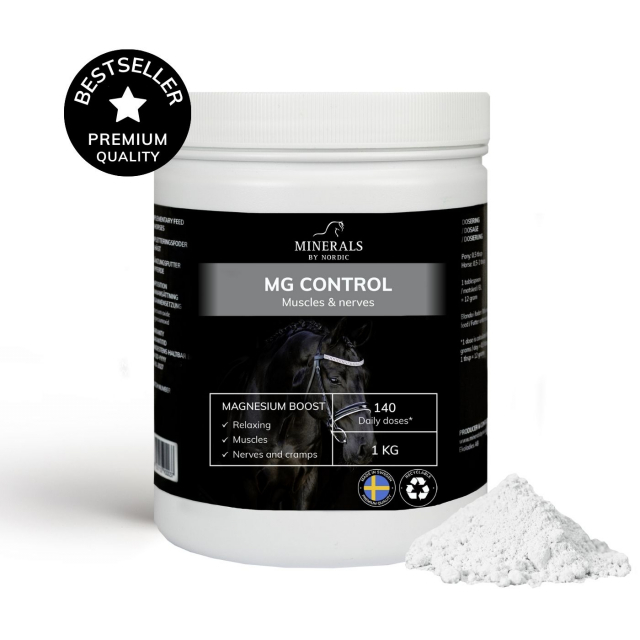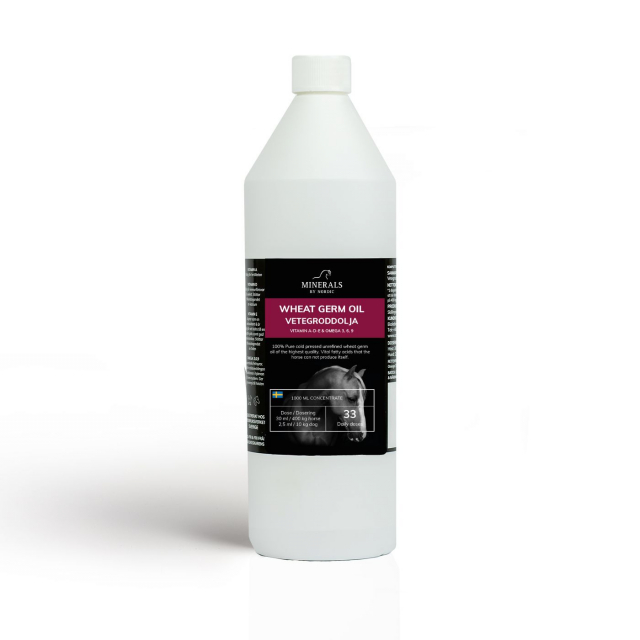
The ultimate guide to supplements for horses
Why do horses need supplements?
Ensuring an optimal nutritional balance for your horse is crucial for its health, performance, and well-being. In this guide, we go through everything you need to know about horse supplements, from the most essential to how to choose the right product for your horse.
Why are supplements important for horses?
Horses have specific nutritional needs that can sometimes be challenging to meet solely through forage. While some advocate that hardfeed helps meet these needs, often large amounts are required, which may not be necessary if you have access to analyzed forage. It can be more cost-effective and better for the horse's health to base the diet on good forage and supplements. Supplements can help fill the nutritional gaps that may arise and ensure that your horse receives all necessary vitamins, minerals, and other nutrients.
Essential nutrients for horses
Amino acids: Building blocks for protein that support muscle growth and repair.
Fatty acids: Important for energy, skin health, and inflammation control.
Minerals: Critical for bone health, blood circulation, and more. If the horse's mineral needs are met, and the gut is in good balance, the horse can produce some vitamins itself.
Vitamins: Important for the horse's overall health and function. Horses can produce some vitamins themselves, and some need to be added. However, it is important to note that even though horses can produce some vitamins themselves, their needs for these and other nutrients may vary depending on age, health status, workload, and other factors. A well-balanced diet is crucial, and in some cases, supplements may be necessary to meet the horse's nutritional needs.
Horses can produce some B vitamins in their bodies. They have a unique ability to synthesize B vitamins through microbes in their large intestine (cecum and colon). These microbes break down fibers from the horse's diet and produce B vitamins, such as Biotin (B7), Folic Acid (B9), and Vitamin B12, as a byproduct.
Vitamin K is produced by the microflora in the horse's large intestine (cecum and colon). Vitamin K is important for blood clotting and also plays a role in bone health. Horses usually get enough Vitamin K through their normal diet and internal production, making supplementation unnecessary under normal conditions.
Vitamin C can be synthesized by horses in their liver from glucose. Vitamin C is a crucial antioxidant that helps protect cells from damage caused by free radicals, supports the immune system, and is also important for collagen formation, which is necessary for skin, blood vessels, tendons, ligaments, and bones. Unlike humans, who need to get Vitamin C through their diet, horses can produce it themselves, making supplements rarely needed as long as they are healthy and not subjected to extreme stress or illness.
Vitamins A, D, and E are important to add to the diet through supplements or concentrates, especially for breeding horses or horses that do not have access to pasture or eat preserved forage.
Vitamin A
Sharp vision: Vitamin A is crucial for eye health and maintaining good vision, especially in low light.
Skin and mucous membranes: It also supports skin and mucous membrane health, contributing to a stronger defense against infections.
Reproduction and growth: Vitamin A is important for reproduction and proper growth in young animals.
Horses can convert beta-carotene (found in fresh grass) into Vitamin A, but under certain conditions, such as during winter when access to fresh grass is limited, it may be necessary to supplement Vitamin A in the diet to ensure the horse's needs are met.
Vitamin D
Calcium and phosphorus balance: Vitamin D plays a central role in regulating the balance of calcium and phosphorus in the body, which is crucial for the development and maintenance of the skeleton.
Bone health: It contributes to strong bones and is particularly important for growing young horses and pregnant mares.
Horses produce Vitamin D when their skin is exposed to sunlight, but for those who spend a lot of time indoors or live in areas with limited sunlight during certain seasons, Vitamin D supplementation may be necessary.
Vitamin E
Antioxidant: Vitamin E is a powerful antioxidant that protects body cells from damage caused by free radicals. It is especially important for muscle health and nerve function.
Immune system: It also supports immune system function and helps prevent inflammation.
Vitamin E is naturally found in fresh grass, but preserved feed like hay may have lower levels of this nutrient, making supplementation important, especially for performing horses and those with limited access to fresh pasture.
We recommend Wheat Germ Oil as a source of ADE vitamins.
Feeding tips...
For young horses
Young horses have higher protein and amino acid requirements for growth, as well as calcium and phosphorus for bone development.
For performance horses
Higher energy requirements and rapid recovery iscrucial, requiring higher levels of energy, amino acids, and electrolytes.
For senior horses
Often need supplements that support joint health and digestion, as well as customized levels of energy and protein.
The best supplements for horses
Balanced mineral supplements: To ensure a correct balance of essential minerals. We recommend them in an organically bound form along with all 20 amino acids, as found in Activ Mineral.
Omega Fatty Acid Supplements: Support multiple body functions and act anti-inflammatory in the right amount. We recommend the vegan microalgae source found in Inflaboost DHA.
Joint Supplements: MSM and Omega 3 are good for supporting joint health. MSM can be found in Activ Mineral and Omega 3 in Inflaboost DHA.
Muscles and Nerves: Support for muscles, cramps, and the horse's nerves are provided by high-quality magnesium. We recommend Mg Control.
Key vitamins: A, D, E vitamins are important for breeding animals and horses that do not have access to pasture or hay but eat preserved forage. We recommend it in the form of Wheat Germ Oil.
Implementing supplements into your horse's diet
It is important to introduce new supplements gradually and monitor your horse's reaction. Start with a low dose and slowly increase to the recommended level.
Why are supplements important for horses?
Horses have specific nutritional needs that can sometimes be challenging to meet solely through forage. While some advocate that hardfeed helps meet these needs, often large amounts are required, which may not be necessary if you have access to analyzed forage. It can be more cost-effective and better for the horse's health to base the diet on good forage and supplements. Supplements can help fill the nutritional gaps that may arise and ensure that your horse receives all necessary vitamins, minerals, and other nutrients.
Essential nutrients for horses
Amino acids: Building blocks for protein that support muscle growth and repair.
Fatty acids: Important for energy, skin health, and inflammation control.
Minerals: Critical for bone health, blood circulation, and more. If the horse's mineral needs are met, and the gut is in good balance, the horse can produce some vitamins itself.
Vitamins: Important for the horse's overall health and function. Horses can produce some vitamins themselves, and some need to be added. However, it is important to note that even though horses can produce some vitamins themselves, their needs for these and other nutrients may vary depending on age, health status, workload, and other factors. A well-balanced diet is crucial, and in some cases, supplements may be necessary to meet the horse's nutritional needs.
Horses can produce some B vitamins in their bodies. They have a unique ability to synthesize B vitamins through microbes in their large intestine (cecum and colon). These microbes break down fibers from the horse's diet and produce B vitamins, such as Biotin (B7), Folic Acid (B9), and Vitamin B12, as a byproduct.
Vitamin K is produced by the microflora in the horse's large intestine (cecum and colon). Vitamin K is important for blood clotting and also plays a role in bone health. Horses usually get enough Vitamin K through their normal diet and internal production, making supplementation unnecessary under normal conditions.
Vitamin C can be synthesized by horses in their liver from glucose. Vitamin C is a crucial antioxidant that helps protect cells from damage caused by free radicals, supports the immune system, and is also important for collagen formation, which is necessary for skin, blood vessels, tendons, ligaments, and bones. Unlike humans, who need to get Vitamin C through their diet, horses can produce it themselves, making supplements rarely needed as long as they are healthy and not subjected to extreme stress or illness.
Vitamins A, D, and E are important to add to the diet through supplements or concentrates, especially for breeding horses or horses that do not have access to pasture or eat preserved forage.
Vitamin A
Sharp vision: Vitamin A is crucial for eye health and maintaining good vision, especially in low light.
Skin and mucous membranes: It also supports skin and mucous membrane health, contributing to a stronger defense against infections.
Reproduction and growth: Vitamin A is important for reproduction and proper growth in young animals.
Horses can convert beta-carotene (found in fresh grass) into Vitamin A, but under certain conditions, such as during winter when access to fresh grass is limited, it may be necessary to supplement Vitamin A in the diet to ensure the horse's needs are met.
Vitamin D
Calcium and phosphorus balance: Vitamin D plays a central role in regulating the balance of calcium and phosphorus in the body, which is crucial for the development and maintenance of the skeleton.
Bone health: It contributes to strong bones and is particularly important for growing young horses and pregnant mares.
Horses produce Vitamin D when their skin is exposed to sunlight, but for those who spend a lot of time indoors or live in areas with limited sunlight during certain seasons, Vitamin D supplementation may be necessary.
Vitamin E
Antioxidant: Vitamin E is a powerful antioxidant that protects body cells from damage caused by free radicals. It is especially important for muscle health and nerve function.
Immune system: It also supports immune system function and helps prevent inflammation.
Vitamin E is naturally found in fresh grass, but preserved feed like hay may have lower levels of this nutrient, making supplementation important, especially for performing horses and those with limited access to fresh pasture.
We recommend Wheat Germ Oil as a source of ADE vitamins.
Feeding tips...
For young horses
Young horses have higher protein and amino acid requirements for growth, as well as calcium and phosphorus for bone development.
For performance horses
Higher energy requirements and rapid recovery iscrucial, requiring higher levels of energy, amino acids, and electrolytes.
For senior horses
Often need supplements that support joint health and digestion, as well as customized levels of energy and protein.
The best supplements for horses
Balanced mineral supplements: To ensure a correct balance of essential minerals. We recommend them in an organically bound form along with all 20 amino acids, as found in Activ Mineral.
Omega Fatty Acid Supplements: Support multiple body functions and act anti-inflammatory in the right amount. We recommend the vegan microalgae source found in Inflaboost DHA.
Joint Supplements: MSM and Omega 3 are good for supporting joint health. MSM can be found in Activ Mineral and Omega 3 in Inflaboost DHA.
Muscles and Nerves: Support for muscles, cramps, and the horse's nerves are provided by high-quality magnesium. We recommend Mg Control.
Key vitamins: A, D, E vitamins are important for breeding animals and horses that do not have access to pasture or hay but eat preserved forage. We recommend it in the form of Wheat Germ Oil.
Implementing supplements into your horse's diet
It is important to introduce new supplements gradually and monitor your horse's reaction. Start with a low dose and slowly increase to the recommended level.

 SWE
SWE



 ENG
ENG NO
NO AX
AX DE
DE